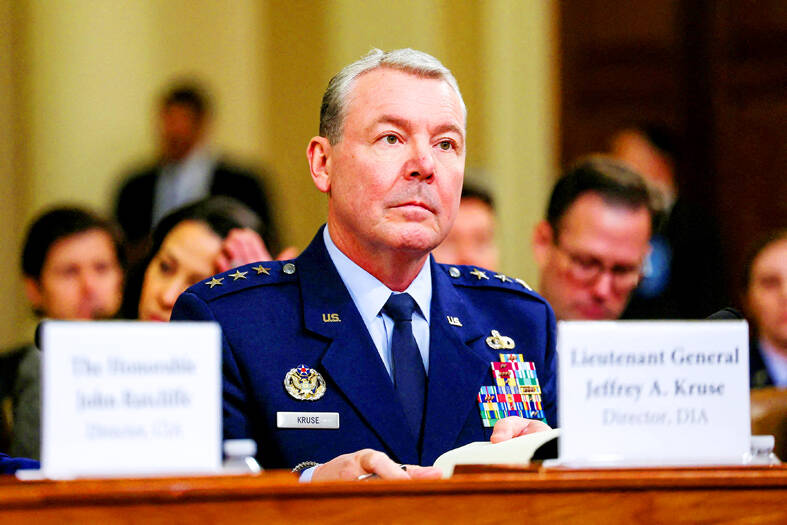US Secretary of Defense Pete Hegseth has fired a general whose agency’s initial intelligence assessment of damage to Iranian nuclear sites from US strikes angered US President Donald Trump, two people familiar with the decision and a White House official said.
US Lieutenant General Jeffrey Kruse would no longer serve as head of the US Defense Intelligence Agency (DIA), said the people, who spoke on condition of anonymity because they were not authorized to discuss it publicly.
The firing is the latest upheaval in the US military and intelligence agencies, and comes a few months after details of the preliminary assessment leaked to the media. It found that Iran’s nuclear program has been set back only a few months by the US strikes, contradicting assertions from Trump and Israeli Prime Minister Benjamin Netanyahu.

Photo: Reuters
The Republican president, who had pronounced the Iranian program “completely and fully obliterated,” rejected the report.
In a news conference following the June strikes, Hegseth lambasted the press for focusing on the preliminary assessment, but did not offer any direct evidence of the destruction of Iranian nuclear production facilities.
“You want to call it destroyed, you want to call it defeated, you want to call it obliterated — choose your word. This was an historically successful attack,” Hegseth said then.
Kruse’s ouster was reported earlier by the Washington Post.
Trump has a history of removing government officials whose data and analysis he disagrees with. Earlier this month, after a lousy jobs report, he fired the official in charge of the data. His administration has also stopped posting reports on climate change, canceled studies on vaccine access and removed data on gender identity from government sites.
The firing of the DIA chief culminates a week of broad Trump administration changes to the intelligence community and shakeups to the military leadership. The US Office of the Director of National Intelligence — which is responsible for coordinating the work of 18 intelligence agencies, including the DIA — announced that it would slash its staff and budget.
The Pentagon announced this week that US Air Force Chief of Staff General David Allvin planned to retire two years early.
Hegseth and Trump have been aggressive in dismissing top military officials, often without formal explanation.
The administration has fired the chairman of the US Joint Chiefs of Staff, Air Force General C.Q. Brown, as well as the US Navy’s top officer, the Air Force’s second-highest-ranking officer, and the top lawyers for three military service branches.
In April, Hegseth fired US General Tim Haugh as head of the National Security Agency and Vice Admiral Shoshana Chatfield, who was a senior official at NATO.
No public explanations have been offered by the Pentagon for any of these firings, but some of the officers were believed by the administration to endorse diversity, equity and inclusion programs.

ELECTION DISTRACTION? When attention shifted away from the fight against the militants to politics, losses and setbacks in the battlefield increased, an analyst said Recent clashes in Somalia’s semi-autonomous Jubaland region are alarming experts, exposing cracks in the country’s federal system and creating an opening for militant group al-Shabaab to gain ground. Following years of conflict, Somalia is a loose federation of five semi-autonomous member states — Puntland, Jubaland, Galmudug, Hirshabelle and South West — that maintain often fractious relations with the central government in the capital, Mogadishu. However, ahead of elections next year, Somalia has sought to assert control over its member states, which security analysts said has created gaps for al-Shabaab infiltration. Last week, two Somalian soldiers were killed in clashes between pro-government forces and

Ten cheetah cubs held in captivity since birth and destined for international wildlife trade markets have been rescued in Somaliland, a breakaway region of Somalia. They were all in stable condition despite all of them having been undernourished and limping due to being tied in captivity for months, said Laurie Marker, founder of the Cheetah Conservation Fund, which is caring for the cubs. One eight-month-old cub was unable to walk after been tied up for six months, while a five-month-old was “very malnourished [a bag of bones], with sores all over her body and full of botfly maggots which are under the

BRUSHED OFF: An ambassador to Australia previously said that Beijing does not see a reason to apologize for its naval exercises and military maneuvers in international areas China set off alarm bells in New Zealand when it dispatched powerful warships on unprecedented missions in the South Pacific without explanation, military documents showed. Beijing has spent years expanding its reach in the southern Pacific Ocean, courting island nations with new hospitals, freshly paved roads and generous offers of climate aid. However, these diplomatic efforts have increasingly been accompanied by more overt displays of military power. Three Chinese warships sailed the Tasman Sea between Australia and New Zealand in February, the first time such a task group had been sighted in those waters. “We have never seen vessels with this capability

‘NO INTEGRITY’: The chief judge expressed concern over how the sentence would be perceived given that military detention is believed to be easier than civilian prison A military court yesterday sentenced a New Zealand soldier to two years’ detention for attempting to spy for a foreign power. The soldier, whose name has been suppressed, admitted to attempted espionage, accessing a computer system for a dishonest purpose and knowingly possessing an objectionable publication. He was ordered into military detention at Burnham Military Camp near Christchurch and would be dismissed from the New Zealand Defence Force at the end of his sentence. His admission and its acceptance by the court marked the first spying conviction in New Zealand’s history. The soldier would be paid at half his previous rate until his dismissal